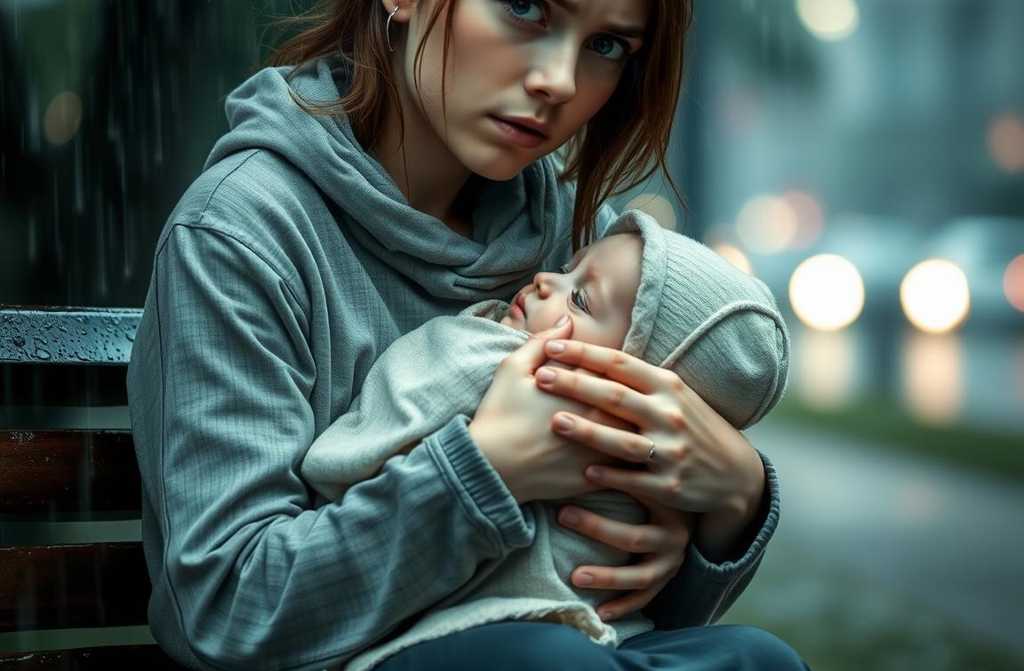That summers day, the routine shattered. Emily walked into the kitchen, her eyes downcast, a baby cradled in her arms. A baby with dark skin, sleeping peacefully, unaware of the storm about to erupt.
Emily was only sixteen, but she already knew what it meant to live surrounded by luxury and yet feel an emptiness so vast not even a mansion could fill it. Her parents were successful entrepreneurs, always rushing from one meeting to the next, jet-setting across the globe, amassing more and more moneybut never time for her. The house was grand, yet cold; the silences heavier than the walls, and affection a luxury theyd never bought for her.
Her father sat at the breakfast bar with a steaming cup of tea, his brow furrowing as he saw her.
“What whose baby is that?” he asked, as if hed seen a ghost.
Emily swallowed hard.
“Dad I need to talk to you. I got pregnant. This is my son.”
The man slammed his cup down; tea spilled across the table.
“What did you say? And with a Black man? What on earth were you thinking, Emily? Hide that child! Our neighbours, our business partners they mustnt find out. Well put him up for adoption.”
Emily lifted her gaze, fear and fury mingling in her eyes.
“No! Hes my son, and I love him!”
“Love? What about our reputation?” Her fathers voice boomed through the kitchen. “What will people say?”
Just then, her mother walked in. She froze at the sight.
“Oh, God tell me you didnt”
Her father finished the sentence.
“Yes. Our daughter has ruined our lives.”
Her mother, colder than the marble countertop, delivered her verdict.
“Either give that baby up or get out of this house.”
Emily clutched little Oliver tighter to her chest.
“I wont abandon him. Ill do whatever it takes.”
Her father didnt hesitate.
“Then leave.”
The door slammed shut behind her with a sharp thud. Outside, rain poured in sheets. Emily wandered aimlessly, drenched, the baby wrapped in a thin blanket that barely shielded him. She found a bench in a park and sat, shielding him with her own body. She was cold, hungry, and terrifiedbut she never let go.
Then a woman in her forties, holding a battered umbrella and a cloth bag slung over her shoulder, approached.
“Love why are you out here in the rain with your baby?” she asked gently.
“My parents they threw me out,” Emily replied, trying to sound steady.
“Are you hungry?”
“No,” she lied, as her stomach growled loudly.
The woman smiled kindly. “Come with me. My place is small, but its warm. Lets get you some dinner.”
That woman was Margaret. She lived in a modest little flat with peeling wallpaper, but it was filled with a warmth Emily had never known in her grand home. Margaret was a seamstress, and that night, she served Emily a bowl of hot stew, which she devoured between tears.
Over time, Margaret gave her more than shelter and foodshe gave her a trade. She taught her to sew, to mend, to save every penny. Together, with an old pedal machine, they made clothes to sell at the market. Little Oliver grew up surrounded by fabric, thread, and genuine laughter.
Eighteen years later, life had changed. Emily, now a confident woman, lived in a modest but cheerful flat with Oliver, who was about to graduate from secondary school.
One afternoon, there was a knock at the door. A man in a suit introduced himself as a solicitor.
“Miss Emily, Im here to inform you that your parents passed away last week. According to the will, you are the sole heir.”
Emilys throat tightened. Oliver squeezed her hand.
“What does that mean?” he asked.
“It means the house, the business, and the entire estate now belong to you,” the solicitor said.
Emily was silent for a moment before looking at her son.
“Oliver theres something Ive always wanted to tell you. You youre not my biological child.”
The young man stared at her, stunned. “What?”
Emily took a deep breath.
“When I was your age, I was walking home one day when it started to rain. I cut through an alley and found a homeless woman in labour. I knelt to help her, and you were born in my arms. Before she died, she begged me, Take care of my son. I couldnt leave you, so I told my parents you were mine, hoping theyd accept us but they threw me out.”
Tears filled Olivers eyes.
“So you gave up your youth to raise me even though I wasnt yours by blood?”
“Yes,” Emily whispered, her voice breaking. “Because the moment I held you, I knew God had chosen me to be your mother. In your eyes, I found my purpose. Youre my light, Oliver my sunshine.”
The young man pulled her into a tight embrace.
“Mum blood doesnt matter. You are, and always will be, my mother.”
Emily chose to return to her childhood homenot to flaunt her inheritance, but to bring Margaret to live with them. To her, the seamstress was her true mother, the woman whod taught her that family isnt always the one youre born into, but the one that holds you when you need it most.
In time, Emily used part of the inheritance to open a sewing workshop and scholarships for single mothers. And she always repeated the same words, the ones that had defined her life:
“I had the privilege of being chosen by God to be a mother. No matter the pain or the scars Id do it all over again to see my son happy.”







